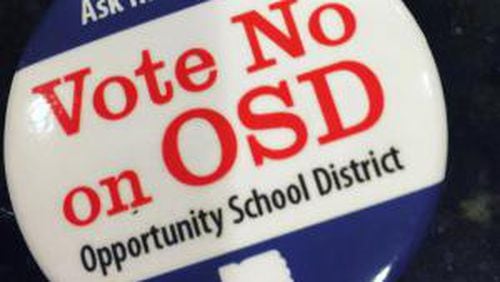Melissa Ladd is a parent of three and teaches fifth grade at Poplar Road Elementary in Coweta County. Dr. Ladd has a doctorate in the field of school improvement and is a finalist for the prestigious national Horace Mann Teaching Award.
She is also one of three named plaintiffs in a class-action lawsuit over the language in the Amendment 1 “Opportunity School District” ballot question. The lead plaintiffs — Ladd, Atlanta parent Kimberly Brooks, and the Rev. Timothy McDonald — charge the ballot language is “so misleading and deceptive that it violates the due process and voting rights of all Georgia voters.”
In this piece, Ladd responds to amendment backers who contend OSD opponents don't care about the students in struggling schools. This is one of the strongest pieces I've seen from an opponent because Ladd addresses a key issue in high-poverty schools -- the relationships between staff and students and staff and parents.
Ignoring the longstanding relationships schools have with the local communities can undermine takeover efforts. The postmortems on why the Tennessee Achievement School District -- on which the OSD is modeled in large part -- missed the mark often blame the inability of the charter school operators to win over the community.
A story in Chalkbeat Tennessee noted:
"This has been humbling for me," said one operator who came to Tennessee from another state. "I've learned so much about just how complex education can be in particular landscapes."
With that background, here is Ladd's piece.
By Melissa Ladd
Since filing our 41-page legal complaint over the so-called “Opportunity School District” Amendment, proponents of state takeover have lashed out, but they have ignored every substantive argument made in our 41-page complaint. To suggest the ballot language is anything less than deceptive is not an “opinion” grounded in reality.
The language is purposely misleading and endangers public schools. But what I want to focus on here is the vapid claim made by OSD proponents that those who oppose the school takeover amendment rarely talk about “the kids.”
As a mother and a Georgia public schoolteacher, I have dedicated my entire life to enriching and improving the lives of children. I have a master’s degree in reading instruction and a doctorate in school improvement. I have conducted extensive research on the most effective methods to close the achievement gap in reading for public school students living in poverty.
Everything in my experience as an educator has led me to conclude that the Opportunity School District is a bad deal for Georgia students.
So, yes, by all means, let’s talk about the kids.
Who exactly are these children whose future will be bought and sold by the state takeover plan? According to the non-profit, nonpartisan research organization Georgia Budget & Policy Institute, the overwhelming majority are minority (88 percent are black) and low-income (92 percent participate in the federal free-and reduced-lunch program).
These children are often hungry, neglected or abused. One young boy in my classroom had 12 rotten teeth that were keeping him up at night -- a condition that wasn’t discovered until a routine dental check at school. Another student reached out to the school counselor because her mother was suffering from unmedicated schizophrenia. The counselor made home visits to help the family put together a plan for recovery. Another young girl in my classroom, a victim of rape, did not have transportation to go to a counselor, much less the money to afford counseling. She relied on school resources for help.
The children in these so-called "failing" schools are suffering from unimaginable chronic stress as result of systemic poverty. As a recent Children's Defense Fund study showed, chronic stress actually changes a child's brain chemistry. It severely inhibits higher order thinking skills -- the kind tested by the Georgia Milestones Assessment System.
The school is the only stable environment many of these children have. Teachers might be the only hug the kids get for the day. Their school lunch may be the only warm meal they get for the day or the only meal they get, period. We are the last line of defense for these kids, and no one can learn if their basic needs aren’t being met. When you have a congregated population of poverty, you are going to have a struggling school no matter how hard the teacher tries.
The school takeover amendment does nothing to address these concerns, and, in fact, will only make things worse by taking three percent out of school budgets for “administrative operations.”
If we want to see real change in these communities, we need to build relationships. You cannot have an unelected political appointee come into an impoverished area and get the parents to trust what they are doing by firing all the teachers and replacing them with strangers -- a very real concern given the new powers Amendment 1 would grant the state education czar.
If opponents of the school takeover talk a lot about parents and teachers, it isn’t out of self-interest. It’s because we are the only folks who can truly advocate for the kids. If our children are forced into a state-run system that lacks the checks and balances offered by a local, elected school board, kids are going to fall through the cracks. Some out-of-state, for-profit corporation won’t know these kids’ families, their situation or their risk factors, the way local communities do.
Children are not mere products created by a corporation. They are worth more than just a test score. But if we allow Amendment 1 to pass, our kids will be nothing more than a statistical liability to a school’s bottom line. They deserve better.
So when it comes to Amendment 1, yes, let’s please talk about the kids.
About the Author







